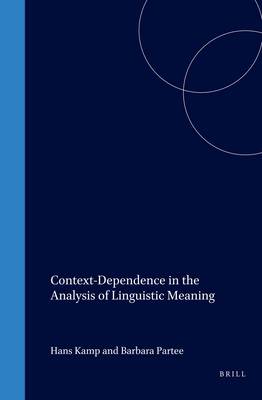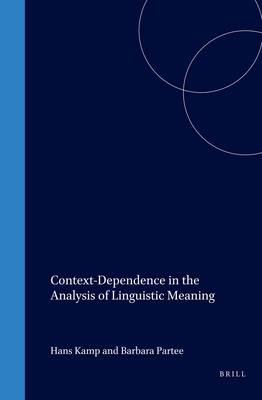
Bedankt voor het vertrouwen het afgelopen jaar! Om jou te bedanken bieden we GRATIS verzending (in België) aan op alles gedurende de hele maand januari.
- Afhalen na 1 uur in een winkel met voorraad
- In januari gratis thuislevering in België
- Ruim aanbod met 7 miljoen producten
Bedankt voor het vertrouwen het afgelopen jaar! Om jou te bedanken bieden we GRATIS verzending (in België) aan op alles gedurende de hele maand januari.
- Afhalen na 1 uur in een winkel met voorraad
- In januari gratis thuislevering in België
- Ruim aanbod met 7 miljoen producten
Zoeken
Context-Dependence in the Analysis of Linguistic Meaning
€ 442,95
+ 885 punten
Omschrijving
Does context and context-dependence belong to the research agenda of semantics - and, specifically, of formal semantics? Not so long ago many linguists and philosophers would probably have given a negative answer to the question. However, recent developments in formal semantics have indicated that analyzing natural language semantics without a thorough accommodation of context-dependence is next to impossible. The classification of the ways in which context and context-dependence enter semantic analysis, though, is still a matter of much controversy and some of these disputes are ventilated in the present collection. This book is not only a collection of papers addressing context-dependence and methods for dealing with it: it also records comments to the papers and the authors' replies to the comments. In this way, the contributions themselves are contextually dependent. In view of the fact that the contributors to the volume are such key figures in contemporary formal semantics as Hans Kamp, Barbara Partee, Reinhard Muskens, Nicholas Asher, Manfred Krifka, Jaroslav Peregrin and many others, the book represents a quite unique inquiry into the current activities on the semantics side of the semantics/pragmatics boundary.
Specificaties
Betrokkenen
- Uitgeverij:
Inhoud
- Aantal bladzijden:
- 568
- Taal:
- Engels
- Reeks:
- Reeksnummer:
- nr. 11
Eigenschappen
- Productcode (EAN):
- 9780080436944
- Verschijningsdatum:
- 15/09/2002
- Uitvoering:
- Hardcover
- Formaat:
- Genaaid
- Afmetingen:
- 225 mm x 157 mm
- Gewicht:
- 984 g

Alleen bij Standaard Boekhandel
+ 885 punten op je klantenkaart van Standaard Boekhandel
Beoordelingen
We publiceren alleen reviews die voldoen aan de voorwaarden voor reviews. Bekijk onze voorwaarden voor reviews.








